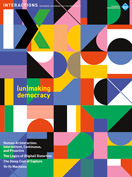Authors:
Subhashish Panigrahi
On August 18, 2021, the Pegasus Project, a coalition of 17 organizations, started to unveil the extent of a highly sophisticated, unlawful surveillance operation of more than 50,000 individuals in 40 different countries by authoritarian regimes, potentially by using the Pegasus spyware developed by NSO Group, a private Israeli tech firm [1]. The targets of the snooping were human rights defenders, journalists, and politicians, among others. In India, this ongoing mass surveillance has led to gross abuses of human rights while having no legal basis. Here, I argue that grassroots-level education on self-protection with practical counter-infrastructure measures is needed more than ever to combat the mass surveillance that Pegasus and other tech solutions enable. Such a move could also complement and supplement policy and legal reforms for envisioning a systemic move from a panopticon-style governance to an open and transparent one.
The technology that can further humane and participatory civic communication must incorporate an inclusive system design, equipping people with the lowest level of access with the ability to participate with ease.
Lawyers operating on behalf of civil society called for legal reform, comparing the Pegasus revelations to the Watergate scandal in the U.S. [2]. Policy and legal reforms in the recent past, however, have only catalyzed greater centralization of power. For instance, the Internet Shutdowns project (internetshutdowns.in) used public data to estimate that the people of former Indian province Jammu and Kashmir experienced almost 200 shutdowns by 2019 (currently over 300 shutdowns), making it the largest number of and longest-lasting Internet shutdown of any democratic state [3]. These shutdowns happened at the same time as the abrogation of Article 370, a notable policy change administered by the Indian state affecting the sovereignty of local residents. During the Covid-19 pandemic, many other forms of surveillance have arisen across India. The use of facial data collection and recognition-using drones in Kashmir, similar data collection by the state of Telangana [4], and plans for building a layer of private health-data over existing biometric data in Aadhaar are a few of the staggering examples. The rise in state surveillance and Internet shutdowns and slowdowns, as well as the attack on press freedoms, show that we are moving closer to what is often referred to as a panopticon state, where civil liberties are extremely diminished and citizens have little or no access to critical information.
Policy-level changes such as Article 370 call for a closer look at the level of state control over Internet infrastructure, reimagining a federated, distributed peer-to-peer and citizen-led access model. The technology that can further humane and participatory civic communication must incorporate an inclusive system design, equipping people with the lowest level of access with the ability to participate with ease. Also, such platforms must consider the physical safety as well as the linguistic and mobile literacy (literacy of using mobile devices) of end users while prioritizing their anonymity and privacy. Big tech-run intermediary platforms such as WhatsApp are still struggling with the Indian government. The Indian state is pushing for a constitutional change that would allow law enforcement to access people's private data through breaking the encryption for platforms with more than 5 million users. Therefore, small tech-run platforms, preferably those with no cloud storage and a high regard for privacy, might be the way forward. Awala (formerly Relaynet) is a platform that primarily focuses on the use of "couriers" to enable data transfer between users without Internet access [5]. Another example is the remote geo-mapping service Mapeo, which enables communities to collect data offline [6]. There is no dearth of platforms that can be optimized and localized to ensure access to information and participation in knowledge curation by common users, journalists, and oral historians alike. While technology is far from being a solution to the complex geopolitics of many oppressed regions, the underlying guidelines behind openness might address some of the grave issues of knowledge equity and civic custodianship of knowledge.
I would like to thank Sucheta Ghoshal and J. Khadijah Abdurahman who co-curated the Otherwise School, a summer school focusing on the research around tools and techniques of counter-fascism.
1. Kirchgaessner S., Lewis P., Pegg D., Cutler S., Lakhani N. and Safi M. 2021. Revealed: Leak uncovers global abuse of cyber-surveillance weapon. The Pegasus Project. The Guardian. Jul. 18, 2021; https://bit.ly/3Gr4oBo
2. Prakash, P. Pegasus is India's Watergate moment. The Hindu. Jul. 212, 2021; https://www.thehindu.com/opinion/lead/pegasus-is-indias-watergate-moment/article35434074.ece
3. Masiah, N. India's Internet shutdown in Kashmir is the longest ever in a democracy. Dec. 16, 2019; https://wapo.st/3nuveQL
4. Shrivastava, K.S. Telangana offered its own 360 degree citizen tracking system to Modi govt. Huffpost. Sep. 15, 2020; https://bit.ly/3BeU6Az
5. Narea, G. Relaynet Demo at RightsCon 2020. Awala. Nov. 3, 2020; https://www.youtube.com/watch?v=5OWb8J4YuAc
6. Mapeo: Maps from the middle of anywhere. Digital Democracy. 2021; https://www.digital-democracy.org/mapeo/
Subhashish Panigrahi is a co-director at O Foundation. He makes documentary films on and researches open technology, and decolonization of societies and languages. [email protected]
Copyright held by author.
The Digital Library is published by the Association for Computing Machinery. Copyright © 2021 ACM, Inc.









Post Comment
No Comments Found